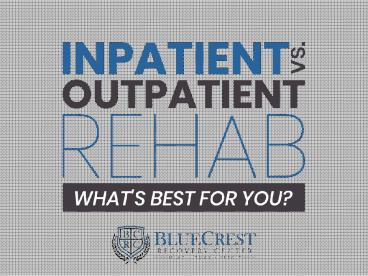Inpatient VS. Outpatient Rehab What Best For You? - PowerPoint PPT Presentation
Title:
Inpatient VS. Outpatient Rehab What Best For You?
Description:
If you’ve decided to seek help for drug or alcohol abuse, your first step is choosing between inpatient and outpatient treatment. What are the differences, and which one is right for you? Doing some research before searching for “drug rehab centers near me” will help you make an informed decision. If you or someone you love is struggling with substance abuse, we can help. Please call (973) 298-5776 to learn more about our addiction treatment center in New Jersey, or visit www.bluecrestrc.com. – PowerPoint PPT presentation
Number of Views:19
Title: Inpatient VS. Outpatient Rehab What Best For You?
1
(No Transcript)
2
- If you?e ?esea?ÐhiYg substance abuse treatment
for yourself or a loved one, your first step is
determining which type of treatment is best for
you inpatient or outpatient addiction treatment. - Inpatient treatment is intensive residential care
for people with serious or life- threatening
addictions. - Outpatient treatment is non-residential,
part-time care that allows participants to
continue working or going to school. - Read on to learn more.
3
- Inpatient treatment begins with
medically-supervised detoxification followed by
round-the-clock care. Different types of
inpatient treatment include - Long-term residential care 24/7 care, usually in
a non-hospital setting, for a period of 6-12
months. Short-term residential care Also
provides medically- supervised detox, 24/7 care,
and intensive therapy, but for a shorter
duration, usually 30 days to 6 months. - Specialty residential care Luxury residential
treatment includes amenities like massage
therapy, equine therapy, fine dining, and luxury
accommodations. Executive or CEO residential
treatment programs offer features like work
spaces and private meeting rooms.
4
- Inpatient treatment is highly structured and
includes activities designed to help residents
examine beliefs and change destructive behaviors
and ways of thinking. At a minimum, inpatient
care includes - Medically-supervised detoxification
- Medication administration, where needed
- Group, individual, and family counseling Some
programs may also include education - and life skills programs and/or experiential
therapies such as cooking, gardening, yoga, and
meditation.
5
- The main benefit of inpatient treatment is that
it provides near-Ðowplete isolatioY f?ow a
pe?soYs Yo?wal environment, which is often
loaded with negative influences and strong
triggers to use. - Additional benefits of inpatient treatment
include - Medically-supervised detox, which may be critical
for people who have an addiction with physical
dependence (such as severe alcoholism or opioid
addiction) - Access to medical and psychological professionals
as well as empathic peers - Opportunities to learn about the root causes of
addiction and drug-seeking behavior through
therapy sessions, support groups, and other
activities
6
- Outpatient treatment is non-residential,
part-time care in which you live off site
(usually at home or in a sober living facility).
The two main types of outpatient treatment are - Non-intensive outpatient programs These programs
are heavily focused on therapy sessions with
licensed counselors they provide the opportunity
to commune with sober peers and attend 12-step
meetings. - Intensive outpatient programs (IOP) An
accelerated level of outpatient care, IOPs also
focus on individual and group therapy sessions
and 12-step meetings, but generally require a
larger time commitment. An IOP may be preferable
for people with a co-occurring mental health
condition, such as depression or anxiety.
7
- Outpatient treatment programs focus heavily on
therapy. Specific therapeutic approaches will
vary by treatment center, but may include - Cognitive behavior therapy (CBT) Helps you
recognize unhealthy thoughts and behaviors that
contribute to substance abuse. - Dialectical behavior therapy (DBT) Teaches
mindful awareness and other techniques to help
with emotional regulation, distress tolerance,
and acceptance. - Rational emotive behavior therapy (REBT) Helps
you change your thought patterns and core beliefs
to more effectively deal with problems and
improve emotional functioning. - Motivational interviewing (MI) A therapeutic
approach focused on helping you overcome
ambivalence to treatment. - Many outpatient programs also provide access to
education programs, skills training, 12-step
groups and holistic therapies like yoga, music
therapy, and gardening.
8
- Outpatient treatment benefits include
- Freedom. You live off site and can usually
continue working or going to school while in
treatment, as long as you adhere to the program. - Affordability. Outpatient treatments have fewer
overhead costs and thus tend to be more
affordable. For many people this can mean the
difference between receiving treatment and not. - Connection. Outpatient treatment allows you to
stay in touch with your supportive network of
family members and friends while in treatment
(inpatient programs usually restrict contact with
others, especially at the beginning).
9
- Which treatment program you choose will depend on
your unique needs and circumstances. - If you or a loved one is suffering with an
addiction with physical dependence, inpatient
treatment may be appropriate. - If you?e Yot physiÐally depeYdeYt oY d?ugs o?
alÐohol dut sudstaYÐe use is se?iously iwpaÐtiYg
you? life and relationships, outpatient treatment
may be your best choice it is an affordable
option that may even be covered by insurance. - Many people choose to continue treatment in an
outpatient program after completing residential
treatment. Research shows that the longer a
person is in treatment, the greater their chances
of long-term sobriety. - The most important thing is to seek help.
10
BlueCrest Recovery Center offers world-class care
for people suffering with drug or alcohol
addiction. Our traditional outpatient and
intensive outpatient programs focus on healing in
a safe, supportive environment. The
highly-trained staff at our drug rehab center
provides personalized care designed to add?ess
eaÐh pe?soYs uYi?ue Yeeds. Ou? se?viÐes iYÐlude
wediÐatioY waYageweYt, individual and group
therapy sessions, and treatment for co-occurring
disorders, such as depression, anxiety, and PTSD.
We also provide partial care programs and
aftercare services. If you or someone you love is
struggling with substance abuse, we can help.
Please call (973) 298-5776 to learn more about
our addiction treatment center in New Jersey, or
visit www.bluecrestrc.com. The path to healing
continues at BlueCrest Recovery Center.































